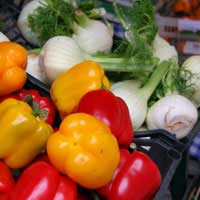Which Foods Provide These Vitamins?

How much do you know about vitamins? Try this quiz!
Vitamin A
Vitamin A (retinol)is a fat-soluble vitamin that is essential for sight, and the immune system and supports the growth of cells, especially skin cells.
Question 1: What foods provide vitamin A?
Ans: Liver. Liver including fish liver, is a key source of vitamin A, as are dairy products and eggs. Plant sources include orange vegetables including carrots and sweet potatoes, dark green leafy vegetables and melon, apricots and peaches.Vitamin B
The B vitamins are important for cell metabolism.There are eight of the B vitamins.Question 2: Name each of the B vitamins and one food source for each
Plus one food that provides most or all of them. Which B vitamin is hard to get in a vegan diet?Answer: Yeast and yeast extract are a source of most or all of the B vitamins. Vegans can find it hard to get enough vitamin B12, because most sources are from animals.
Vitamin B1 (Thiamine) - pork provides a high dose of thiamine – other sources include sunflower seeds, flax seeds, kale, cauliflower, oranges, potatoes, fish, beans, soya, whole grains, eggs and liver.
Vitamin B2 (Riboflavin) - sources of riboflavin include dairy products, eggs, nuts, liver and kidneys, green leafy vegetables, broccoli, tomatoes, legumes, mushrooms and almonds.
Vitamin B3 (Niacin) - niacin sources include liver, meat, fish, cereal, legumes and peanuts.
Vitamin B5 (Pantothenic acid) - pantothenic acid in high doses is found in wholegrains, eggs, meat, legumes, royal jelly, yogurt and avocados.
Vitamin B6 (Pyridoxine)Vitamin B6 sources include meat, potatoes, wholegrains, bananas, beans, dairy products, egg yolks, liver, kidneys and nuts.
Vitamin B7 (Biotin) - liver is a rich source of biotin, as is raw egg yolk.
Vitamin B9 (Folic acid) - good sources of folic acid include dark green leafy vegetables, legumes, egg yolks, sunflower seeds, kidney and liver, and orange juice.
Vitamin B12 (Cyanocobalamin) - vitamin B12 almost exclusively comes from animal sources, including fish, meat (liver has high levels), dairy products and eggs. There is some in seaweed, but this is not a reliable source.
Vitamin C
Vitamin C (Ascorbic acid) is an antioxidant, and helps form collagen for healthy bones, teeth and gums. It helps with wound healing, and improves the absorption of iron and calcium.Question 3: What are good sources of vitamin C, and which especially good one comes from the hedgerows?
Answer: Fruit and vegetables - are the main source of vitamin C, especially rose hips.Vitamin D
Vitamin D is one of a family of vitamins, and is important for teeth and bones, because it works with calcium.Question 4: Where does vitamin D come from? Is it all from the diet?
Answer - Oily fish, mushrooms, eggs, dairy and meat (especially liver) - all contain vitamin D. The skin, in sunlight, makes vitamin D – around 20 minutes about three times a week provides an adult dose of vitamin D.Vitamin EVitamin E (Tocopherol) is an antioxidant and is important in red blood cells.

Re: Can Our Bodies Make Our Own Vitamins?
@paty I am in the same boat with the digestive system. Usually a quick 1 day juice/water fast will strengthen my…
Re: Can Our Bodies Make Our Own Vitamins?
Hi ..a friend of mine told me that our body can produce vitamin B which I'm skeptical about.As far as I know our body…
Re: Beri Beri and Pellagra: Deficiency of Vitamins B1, B3
My friend's Chihuahua was suddenly paralyzed. The vet suggested expensive back surgery, expensive…
Re: Why Do We Need Vitamins
Diamond - Your Question:This is a very good and helpful resource.Our Response:Thanks Diamond
Re: Why Do We Need Vitamins
This is a very good and helpful resource.
Re: The Effect of Caffeine on Vitamin Absorption
"Try drinking an extra glass of milk every day also to keep calcium levels healthy" only in dreams milk is…
Re: Q & A: Which Foods Prevent These Deficiencies?
This information above helped me a lot when I was struggling with my Ancillary health care assignment.…
Re: Q & A: Which Foods Prevent These Deficiencies?
Accurately &fast useful advice Thank you! I now have knowledge
Re: Q & A: Which Foods Prevent These Deficiencies?
marasmus resulting from incorrect feeding or malabsorption of nutrients
Re: Vitamins for Men
I am shahzad now I am 20 since last 6 years I have been suffering in this sexual abuse things .The drops comes through my penis .my penis is weak…